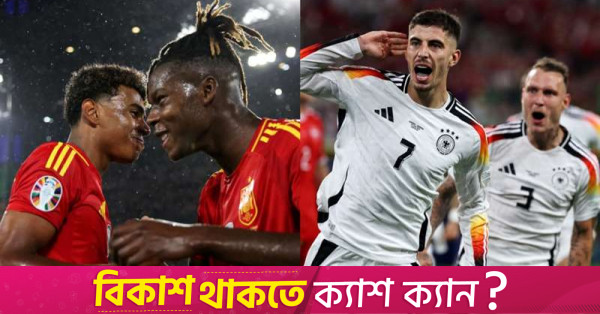Germany vs Spain Euros 2024 Quarterfinal – A tactical preview

I hardly ever offer predictions regarding which teams I expect to win the game unless it’s a clear distinction on the pitch. Games such as Germany vs Spain make it a ton easier for people like me because it’s impossible to predict which is the better team.
Credits: ESPN
Just look at this image for context. What difference do you really see? Both are unbeaten. Both look decisive. Both are great with the ball at their feet and both of these teams are clear cut favourites to win the Euros. To decipher which team excels or falls short than the other in certain areas, we will need to take a deep dive.
Germany vs Spain Head-to-Head
The quarter-final clash between Germany and Spain promises to be a significant challenge for the hosts, Germany, as they face the only team to have won all four of their games so far. Historically, no host nation has ever been eliminated at this stage of the UEFA European Championship. The four previous host quarter-finalists—England in 1996, the Netherlands in 2000, Portugal in 2004, and France in 2016—have all progressed.
Germany boasts a remarkable record at the quarter-final stage. This match will be their 19th quarter-final tie across the World Cup (14) and European Championship (5), the most of any European nation. They have advanced from 15 of their previous 18 ties (83%), including all four at the Euros (1996, 2008, 2012, 2016).
Under Julian Nagelsmann, Germany topped their group by defeating Scotland (5-1) and Hungary (2-0) and drawing with Switzerland (1-1). They overcame a thunderstorm in Dortmund to beat Denmark 2-0 in the round of 16.
Spain, led by Luis de la Fuente, has had a relatively smoother journey. They topped their group by defeating Croatia (3-0), Italy (1-0), and Albania (1-0), before coming from behind to comfortably beat Georgia 4-1 in the round of 16.
This encounter will feature Euro 2024’s two top-scoring teams. Spain has scored nine goals, while Germany has netted 10, equaling their joint-highest tally in a single edition of the competition. Germany’s shot conversion rate of 13.9% is their highest since Euro 2008 (14.5%), though they lost to Spain in the final that year.
Historically, this will be the fourth European Championship meeting between Spain and Germany, with Spain having won two (1984 and 2008) to Germany’s one (1988). Their most recent encounter was the 2008 final, where Spain won 1-0 with a goal from Fernando Torres.
In their latest meeting at the 2022 World Cup, they played to a 1-1 draw in the group stage, with Álvaro Morata’s opener being canceled out by Niclas Füllkrug’s late equalizer. Spain remains unbeaten in their last four major tournament matches against Germany (W2 D2), with these games yielding a total of just six goals (Spain 4, Germany 2). Although Germany lost their first meeting with Spain on German soil (2-1 in a 1935 friendly), they are unbeaten in their last eight home games against La Roja (W5 D3).
Germany’s Style of Play
Attack
Germany’s offensive strategy is characterized by adaptability and versatility. Under Julian Nagelsmann, the team has displayed a mix of progressive and direct play, making it challenging for opponents to contain them. Their approach varies based on the situation, allowing them to be unpredictable and effective.
Germany play direct
Credits: Optavision
Germany showcased their direct approach against Denmark through long passes, bypassing the central congestion created by their opponents. For instance, an aerial ball from Antonio Rüdiger to Kai Havertz caught the Danish defense off-guard, leading to a goal. Their ability to switch between long passing sequences and periods of possession (91.8% passing accuracy so far) has resulted in an average of 2.5 goals per game.
German playmakers manipulating space
Another key aspect of Germany’s attack is their ability to manipulate opponents and create spaces. This was evident from their opening match against Scotland, where Niclas Füllkrug scored after Ilkay Gündoğan’s movement caused Scotland’s defense to collapse, creating space for Füllkrug to exploit. This tactical manipulation will be crucial against Spain, who are known for their solid defense.
Defense
Germany’s defensive strategy mirrors their adaptability in attack. They have been resilient and flexible, conceding only 0.5 goals per game, making them one of the tournament’s strongest defensive sides.
Germany retain their adaptable nature even in defense. Look at this player to player marking situation
Germany typically employs an organized setup that utilizes space effectively, becoming compact when the ball is near their goal. However, they can switch to a player-to-player approach when necessary. Against Hungary, when faced with a fast counterattack, defenders like Antonio Rüdiger and Jonathan Tah quickly adapted by marking key players, ensuring Hungary had no clear opportunity to score.
Nevertheless, Germany has shown moments of vulnerability, as seen in their match against Switzerland. They struggled to handle Bologna’s Dan Ndoye, who exploited spaces between the lines. Spain’s central attackers, similar to Ndoye, will look to capitalize on such lapses. Players like Williams, Yamal, Ferran Torres, and Dani Olmo will aim to exploit these weaknesses, and Germany must ensure these moments are minimized to maintain their defensive solidity.
Key Player: Toni Kroos
While his teammate from the last season at Real Madrid, Joselu, is aiming to retire him on Friday, Toni Kroos certainly won’t be thinking of any date other than July 15 to hang his boots up. Just like his entire career, in this Euro he has been as impeccable.
Kroos has completed 95% of his passes (411 out of 431), setting the record for the highest pass completion rate for any player attempting 300+ passes in a European Championship since 1980. Additionally, Kroos tops the charts at Euro 2024 for line-breaking passes, with 125 to his name.
Spain’s Style of Play
Attack
Spain’s resurgence at Euro 2024 under head coach Luis de la Fuente has been marked by a distinct attacking structure. Despite recent underperformance at major tournaments, de la Fuente has instilled a sense of purpose and direction in Spain’s play, signaling the start of a new era.
Spain have a solid structure
Spain’s attacking strategy is characterized by forward play and positivity with the ball. Their full-backs advance ahead of the center-backs, while the midfield trio focuses on attacking rather than solely protecting the defense. This approach has resulted in an impressive 90.6% passing accuracy. Dubbed “possession with a purpose,” Spain’s play involves shifting the ball into various spaces and constantly looking to advance, leading to an average of 2.25 goals per game.
Spain uses width really well
A key aspect of Spain’s attack has been their threat from wide areas. Athletic Club’s Nico Williams and Barcelona’s Lamine Yamal have been standout performers, frequently accessing half-spaces and making inside runs. Their confidence and ability to get into promising positions have been crucial, as demonstrated by Williams showing for the ball on the edge of the Georgian goal area. Marc Cucurella’s advanced wide positions have facilitated these movements, creating dilemmas for opposing defenders.
Spain’s unpredictability is another vital component of their attacking play. Their fluid rotations and ability to create multiple options make it difficult for opponents to contain them. This fluidity allows players like Aymeric Laporte to have multiple passing options, ensuring that Spain’s attacks are varied and difficult to predict.
Defense
Spain’s defensive play focuses on cohesion and ensuring that gaps are not left open, thus preventing easy scoring opportunities for their opponents. This collective effort has been key to limiting the effectiveness of opposing attacks.
Against Albania, Spain’s defense had to be wary of counterattacks, with Albania known for their quick transitions. In one instance, left-back Álex Grimaldo moved out to close down forward Jasir Asani, leaving a gap that Mikel Merino quickly filled, preventing a secondary attack. This example highlights Spain’s teamwork and their ability to react to each other’s movements, maintaining a solid defensive structure. This disciplined approach has seen them concede only one goal in four matches.
Spain also stays open sometimes
However, Spain’s defense has shown vulnerability when faced with rapid attacks. Both Albania and Italy played at a slower pace, allowing Spain to set up their defensive structure. In contrast, Germany and Croatia’s faster play exposed gaps in Spain’s defense. For example, against Croatia, a gap appeared between two sections of Spain’s players, which Luka Modrić exploited to create a scoring opportunity. Although Croatia failed to convert, it highlighted Spain’s susceptibility to quick, coordinated attacks.
Spain’s defensive stats indicate room for improvement, with a 58.2% success rate in defensive duels and 53.3% in aerial duels. To keep Germany at bay, Spain will need to address these vulnerabilities and ensure quicker recognition and coordination in defense.
Key Players
If you’ve paid attention, you may have noticed the use of a plural form in the subhead because it’s not just one player I feel that will be making a difference.
It’s the exuberance of youth in Nico Williams and Lamine Yamal that excites me. More importantly, such youngsters have a fearless attitude which makes them more dangerous than experienced players. I mean, this duo was playing rock-paper-scissors on the pitch to decide who gets to have a sip of drinking water first after match winning performances against Georgia!
Credits: ESPN
As stated above, Spain relies a lot on width and that brings Williams heavily into the game.
Sixteen-year-old Yamal has made a significant impact for Spain at Euro 2024, providing two assists and becoming only the third teenager on record (since 1980) to achieve this feat at the tournament, following in the footsteps of Enzo Scifo (1984) and Cristiano Ronaldo (2004). He has excelled under pressure, completing 94% of his passes (106 out of 113) while being pressed, the highest rate among Spain players who have played at least 180 minutes in the competition.
Fabian Ruiz must also be talked about. Few would have predicted the significant impact he has had so far. The Paris Saint-Germain midfielder has contributed to five goals in his last four matches for Spain across all competitions (three goals, two assists). He has both scored and assisted in two of his three games at Euro 2024, a feat no player has ever accomplished in three different matches within a single edition of the European Championship.





